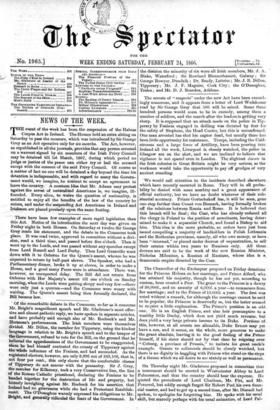Of the remarkable debate in the Commons, so far as
it concerns Mr. Bright's magnificent speech and Mr. Gladstone's most effec- tive and almost pathetic reply, we have spoken in separate articles, and have probably said enough also of Mr. Roebuck's and Mr. Horsman's performances. The Irish members were themselves divided. Mr. Dillon, the member for Tipperary, using the kindest language in relation to Mr. Bright's speech and to the temper of the Government, refused to vote for the Bill, on the ground that he believed the apprehensions of the Government to be exaggerated, since he had himself contested the county of Tipperary against the whole influence of the Fenians, and had succeeded. As the registered electors, however, are only 8,996 out of 249,106, that is, not four per cent., this only shows that the comfortable classes of Tipperary do not concur with the peasantry. Sir J. Gray, the member for Kilkenny, took a very Conservative line, the line of the Roman Catholic priesthood, declaring the Fenians to be banded together for the destruction of life and property, but bitterly inveighing against Mr. Roebuck for his assertion that Ireland had no grievances while she had a Protestant Establish- ment. The O'Donoghue warmly expressed his obligations to Mr. Bright, and generally ridiculed the fears of the Government. In
the division the minority of six were all Irish members, Mr. J. A. Blake, Waterford ; Sir Rowland Blennerhassett, Galway ; Sir George Bowyer, Dundalk ; Dr. Brady, Leitrim ; Mr. J. B. Dillon, Tipperary ; Mr. J. F. Maguire, Cork City ; the O'Donoghue, Tralee ; and Mr. D. J. Rearden, Athlone.






























